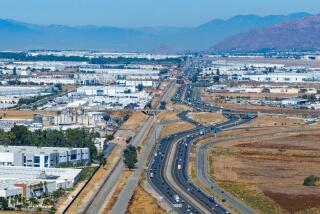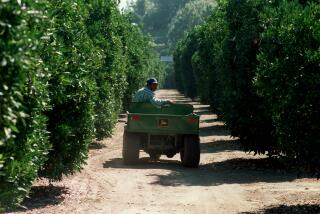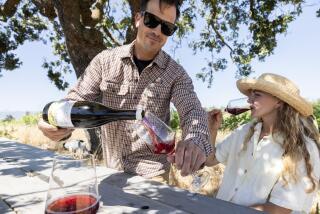‘Not in My Back Forty’ : Flower Family, Encinitas Spar Over Road Plans
- Share via
Chris Calkins had a point to make, so he did it with dead flowers.
At a recent meeting of the Encinitas City Council, Calkins showed up with a withering potted poinsettia in hand.
The manager of the world-renowned Ecke poinsettia empire explained that the plant had been placed behind the tailpipe of a tractor for several hours and exposed to carbon monoxide emissions. The result: one decidedly dead plant.
A similar fate, Calkins warned ominously, awaits the multimillion-dollar operation’s entire crop of Christmas blooms if the city approves a road proposed near the family’s greenhouses.
Sparked a Fierce Fight
Planning a new thoroughfare might seem the most mundane of municipal issues, but this particular strip of asphalt has sparked a fierce fight between the Ecke family and equally determined city officials and neighborhood leaders.
At the heart of the issue, which the council is to debate and decide Thursday, is the destiny of the 900-acre Ecke Poinsettia Ranch, a rich, unincorporated agricultural preserve atop a broad mesa that is bordered on three sides by Encinitas and on the fourth by Carlsbad.
Long something of an agricultural paradise, the Ecke ranch has increasingly been hemmed in by spreading suburbia. With Encinitas city officials now eager to plot out the roads that will traverse the Ecke property, the forces of the outside world seem to be pressing in as never
before.
Arguing that their backs are to the wall, the Eckes have threatened to push forward with an effort to remove their land from the Encinitas “sphere of influence,” placing it instead in the trust of the city of Carlsbad. Such a move would put Carlsbad in a position to plan the territory’s future and take control as it annexes.
Encinitas city officials have not taken kindly to the idea of losing planning power over the Ecke land, which is the virtual geographic centerpiece of their newly incorporated community. Some have labeled the Eckes’ action little more than blackmail.
Of late, several Encinitas leaders, in particular Councilwoman Marjorie Gaines, have been pushing a plan that would swing a two-lane road through the southern section of the Ecke property, an area where the family is planning a major expansion of its poinsettia growing.
Another Road to North
In addition, another road would meander across the northern half of the land, linking Leucadia Boulevard with the busy central business district along El Camino Real.
Gaines and others have pressed for those links as an alternative to a direct, four-lane connection between Leucadia Boulevard and Olivenhain Road.
Officials’ fear of that road is essentially twofold. For starters, it follows the path of Highway 680, a long-planned and much-reviled expressway that helped spark the Encinitas incorporation effort of 1986. Moreover, they say the four-lane road would send too much traffic through quiet residential sections of Leucadia.
The Eckes, meanwhile, have favored the direct link, saying it would steer traffic away from their poinsettia operations, which are focused on the southern end of the mesa, while providing Encinitas with the east-west road it so vitally needs to ease traffic congestion.
“Right now, we have this sort of little island situation that protects us from the outside world,” said Paul Ecke Jr., son of the poinsettia pioneer who first purchased the San Diego County land 60 years ago. “But, if the road system went through the way they’re talking about, it would just pollute us.”
Indeed, Ecke said, exhaust fumes and dust from cars, as well as light from street lights or automobile headlights, could dramatically harm the productivity of the plants.
Bushel of Evidence
Ecke can offer a bushel of scientific evidence to back up such claims. In addition, a dozen floral and agricultural operations across the country have, at the behest of Ecke, written letters to the city noting the effects of auto emissions, dust and other byproducts of urban life on their crops.
Finally, the Eckes point to their own experiences. Before World War II, the family raised poinsettias in the Hollywood area, but the operation was shut when increased air pollution in the Los Angeles basin began stunting the growth of the fragile plants.
“We could not grow the plants, because the smog got so bad,” Ecke said. “So we’ve had that sort of real-life experience.”
Some council members are sympathetic with the Eckes’ arguments, among them Anne Omsted.
“They have really focused all their agricultural stuff on the southern end of the property,” Omsted noted. “It doesn’t take great minds to understand that a road running through that area would really mess them up.”
Gaines, however, suggests that agriculture may have less to do with the Eckes’ desires than a healthy zeal to get the maximum development potential of the northern and eastern sections of their property, which are now being leased to other farmers.
Would Aid Development
A four-lane road cutting through the northern tier of the family’s vast holdings would particularly aid development in Green Valley, Gaines said. The valley, a swath of land along El Camino Real being considered for a commercial and office complex, is expected to be the first section of the Ecke property developed, possibly in about a decade.
“I don’t think the poinsettia issue is as valid as they’re trying to make it,” Gaines said. “I think the future development of their property is their prime concern, but they’re hiding behind the smoke screen of their poinsettia operation. They’re playing the development game while saying they’re just flower growers.”
She also said the firm’s plans to expand on the southern parts of its property could easily be altered to allow a two-lane road to swing through the area with little effect on poinsettia crops.
“Quite frankly, they have not built those greenhouses they’re talking about,” Gaines said. “I don’t see any reason why they can’t alter any plans they have and build the greenhouses a little farther north to allow a road to pass to the south.”
Although the Eckes contend that they have long been planning their greenhouse operations on the southern property to avoid effects of Highway 680, Gaines argues that the family should have realized long ago that the highway might never get built along the planned route.
“The Eckes haven’t been hiding under a rock during all the years that we’ve been opposing 680,” Gaines said. “It hasn’t been a secret to the Eckes that 680 likely wouldn’t happen.”
Benefits Questioned
In the meantime, some officials from Carlsbad have come out in favor of the direct link favored by the Eckes, arguing that the road system being championed by Gaines would do little to ease traffic along busy La Costa Avenue.
“I don’t want to fight with the city of Encinitas; it’s just that the link between Leucadia and Olivenhain Road is very important to me,” said Carlsbad Councilwoman Ann Kulchin. “It would really help to relieve traffic on La Costa Avenue.”
The Eckes, meanwhile, contend that they have little interest in developing any of their property.
“People think Paul has this grand map he can pull out of a drawer showing all the plans for the property, but he doesn’t,” said Calkins. “It’s difficult for people to believe that someone would want to stay in farming, that they wouldn’t naturally want to sell out for tons and tons of money. But the Eckes don’t want that.”
For one thing, Calkins said, the family has been in the business since 1906. For another, there is no place to move to, no other spot with such a perfect microclimate of sunny days and breezes that makes the mesa so select a spot for poinsettias.
“We do not have any plans at this moment to do anything other than farm,” Ecke said, noting that his son, Paul Ecke III, plans to carry on the family business. “I’d like to see this area in agriculture as long as there is an Ecke to farm the land.”
As for roads across the family’s land, Ecke insists he would just as soon not see any ever built, but understands the realities of life.
“If the world feels it needs a road, put it anywhere, but don’t screw us up,” he pleaded. “Please, please, let us farm.”
More to Read
Sign up for Essential California
The most important California stories and recommendations in your inbox every morning.
You may occasionally receive promotional content from the Los Angeles Times.













